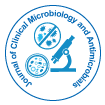

Research: Journal of Clinical Microbiology and Antimicrobials
Research Article: Journal of Clinical Microbiology and Antimicrobials
Editorial: Journal of Clinical Microbiology and Antimicrobials
Editorial: Journal of Clinical Microbiology and Antimicrobials
Research Article: Journal of Clinical Microbiology and Antimicrobials
Posters & Accepted Abstracts: Journal of Antivirals & Antiretrovirals
Posters & Accepted Abstracts: Virology & Mycology
Posters-Accepted Abstracts: Virology & Mycology